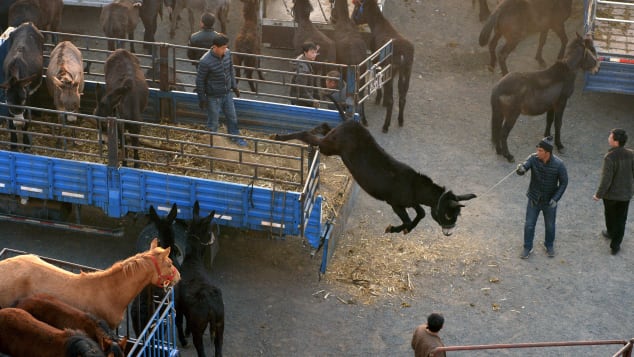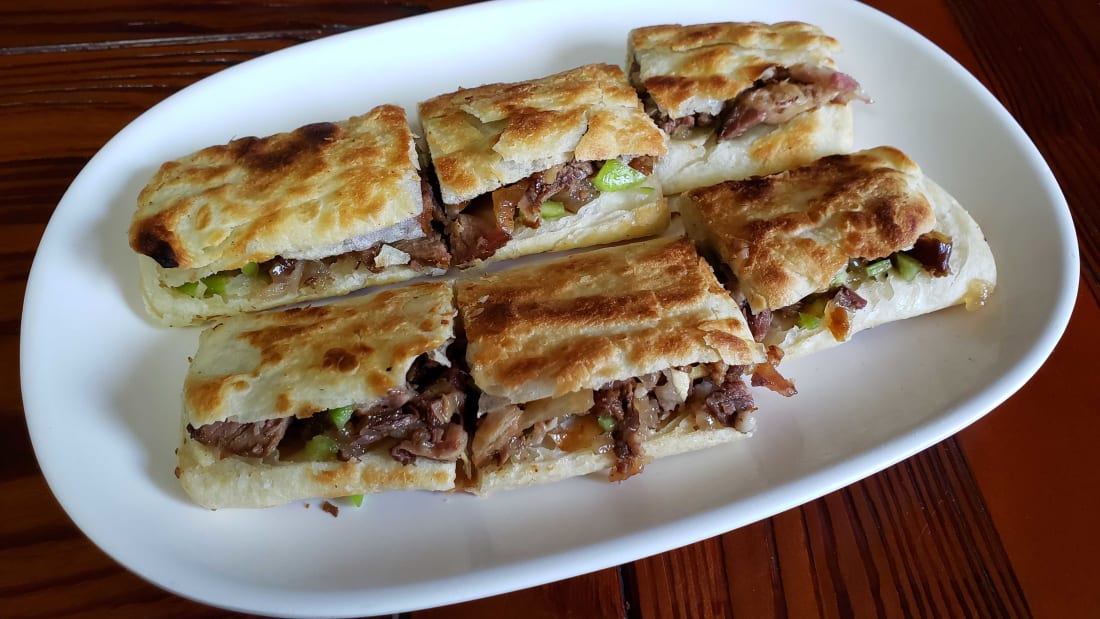#DonkeyBurger #Burger #Chinesefood #Xicheng #FatWang
Beijing (CNN) — From steamed dumplings to hot pot, traditional Chinese food has often proved hugely popular in the West. Now, Chinese restaurant owners are hoping they have found the next delicacy to crack the Western market -- donkey burgers.
In Beijing, the unusual dish is undeniably popular.
At lunch hour, diners pour into the brightly colored "Fat Wang's Donkey Burger" restaurant in the busy Beijing central district of Xicheng.
Sitting at a counter with a group of friends, Beijing local Wang Li Min is tucking into the restaurant chain's signature donkey burger, which comes in a long, thin bun with spring onions.
"In China, we have a saying," Wang says, between bites. "In heaven, there is dragon meat. On Earth, there is donkey meat."
The meat tastes gamey and full of flavor, more like beef than chicken or pork.
Originally a northern Chinese delicacy from Hebei province, the donkey-based snack has spread to major cities across the country. There are more than 20 Fat Wang's branches in Beijing alone.
Just how popular donkey burgers are across the whole of China is debated. According to Sun Yu Jiang, a professor at the Qingdao Agricultural University, heavy demand is only really isolated to a few big provinces such as Hebei or Xinjiang.
"Donkey meat is not the mainstream product of meat consumption," he says. "Most people in China are more likely to eat pigs, poultry, cattle and sheep."

Donkeys, horses and mules are gathered for sale at a livestock trading market in Faku, northeastern China's Liaoning province on April 11, 2016.
STR/AFP via Getty Images
But Zhang Haitao, the official Hebei government-sanctioned representative of the donkey burger and founder of the Kung Fu Donkey restaurant chain, says demand is growing faster than supply. He even thinks it could go global.
"When I was the president of the Hejian Donkey Burger Association (earlier this year), the market value of the donkey burger business was about 8 billion yuan per year," he says. That's around $1.1 billion.
"But if the donkey meat market can improve, the industry's market value could be at least 100 billion yuan in the future," he adds.
Emperors and trains
There are different stories about how donkey meat became a popular delicacy in northern China.
Wang Haibo, regional head of the Fat Wang's chain and nephew of the eponymous founder, says the legend of donkey meat goes back to the 1700s during the reign of the Qing dynasty's Qianlong Emperor.
"When the emperor was traveling south, he stopped at Hejian Fang in Hebei province. He felt hungry at night and asked a eunuch if there was anything he could eat. The woman at the house he stayed at made him a pancake. Coincidentally, they had just killed a donkey and stewed its meat, so she put them together and gave it to the emperor," Wang says.

Wang Haibo, regional head of Fat Wang's Donkey Burgers, with a sample of the store's signature products in Beijing in September.
Ben Westcott/CNN
According to Wang, the emperor was so impressed by his meal that he brought the recipe back to Beijing, from where it spread across the country.
Another explanation is that Hebei province's many donkeys, previously used for freight transport, fell into disuse after the introduction of railways towards the end of the Qing Dynasty. No longer needing them for transport, locals found another use for their donkeys.
But the government-sponsored expert, Zhang, says the story is very simple. Shortly after the founding of the People's Republic of China in 1949, farmers began to use donkey meat as food when they traveled for work.
"Donkey meat was cheapest at that time. The donkey burger can be stored for several days before it gets sour," he says. Over time, according to Zhang, it spread to other nearby provinces and cities
Whatever the reason, the dish has now become a major part of northeastern Chinese cuisine and is increasingly being used to attract tourists.
Hebei province even hosted its first annual donkey burger festival in May 2017.
"The demand for donkey is growing, but the market has shifted in recent years. It was a low-end market before, and now it has become a middle or high-end market," Zhang says.
However, there are indications that instead of growing, the donkey meat market in China is actually shrinking.
According to official Chinese government data, the number of donkeys being kept as livestock shrank almost 50% over the past 10 years to 2.53 million in 2018. In comparison, before the recent swine fever crisis, China had more than 420 million pigs.
Qingdao professor Sun says the drop was probably partly due to the growing industrialization of transportation and agriculture. Also, raising donkeys is expensive and time-consuming.
Fast food sensation?
Originally from Hebei, Fat Wang's is one of China's largest donkey meat restaurant chains. Apart from their signature donkey burgers, they also are known for donkey meat hotpots.
Regional head Wang is very particular about how to handle donkey meat. "It has to be from donkeys that are older than three years. If they are too young, the meat will be too soft to eat. If the meat is frozen it won't taste good," he says.
Wang explains that it is their family's recipe for donkey burgers they use to this day. And now they want to share it with the world.
"I am thinking about expanding outside of China," Wang says. "It's just that so far our management team can't follow the speed of expansion (domestically) ... But I think we can expand this to the Western world."

One of about 20 outlets of the popular donkey meat chain Fat Wang's Donkey Burgers across Beijing.
CNN/Ben Westcott
Kung Fu Donkey's Zhang says there are already several people looking into opening branches overseas.
"It has been called a model for 'Chinese fast food' ... The cooking procedure of donkey burger can be standardized like the hamburgers of McDonald's and KFC," he says, adding that he'd like to emulate the success of hot pot sensation Haidilao, which has hundreds of branches around the world.
They might be fighting an uphill battle. A donkey burger restaurant which opened with much fanfare in the Australian city of Sydney in 2018 appears to have already closed permanently.
Wang says he's relying on Chinese Americans to spread the word about the great taste of donkey meat and create a market for it in the United States.
Whoever gets there first, Wang says he's happy to wait as he's not worried about his competition.
"Their burgers will never taste like ours," he says.

Comments
Post a Comment